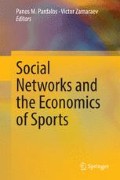Abstract
Socio-economic prediction of medals for London 2012 is performed “by sport” using OLS and a discretization routine. The success ratio is above 65 % for any given sports, especially for disciplines that award more than 30 medals. At the overall country level, the success raises above 85 %. The analysis of the award winning process by sports shed also new light about the critical factors that might dictate the success and that are liable to set sport policies, including the development of sound social networks and the investment on sport infrastructures to foster talent.
Access this chapter
Tax calculation will be finalised at checkout
Purchases are for personal use only
Notes
- 1.
We have also done the significance analysis with the two original models to demonstrate the higher potential for analysis of the proposed model (see Appendix). In the JA model, the variables with predictive power are GDPCAP and POP as well as MED to account for size of the sport or number of medals to be awarded. HOST and FROST also play an important role. In the Pfau model, \(MShare_{t-1}\) accounts for tradition in basically all of the sports as well as POP. It is very difficult for newcomer countries to win medals unless the medals are bought via nationalization [16]. The models might also be compared, in terms of full explanation, as measured by the adjusted correlation coefficient; both the Pfau model and the “by sport” summer model perform better than the JA model.
References
Balmer, N. J., Nevil, A. M., & Williams, M. (2001). Home advantage in the Winter Olympics (1908–1998). Journal of Sport Sciences, 19, 129–139.
Bale J., Sang J. (1996) Kenyan running. Movement culture, geography and global change. London: Frank Cass.
Bernard, A. B., & Busse, M. R. (2004). Who wins the Olympic Games: Economic resources and medal totals. Review of Economics and Statistics, 86, 413–417.
Brownlie, L. W., & Kyle, C. R. (2012). Evidence that skin suits affects long track speed skating performance. Enginnering of Sport Conference Book Series, 34, 26–31.
Davidson, R., Richard, C., & Williams, A. M. (2009). The use of sports science in preparation for Olympic competition. Journal of Sports Sciences, 27, 1363–1365.
Forrest, D., Sanz, I., & Tena, J. D. (2010). Forecasting national team medal totals at the Summer Olympic Games. International Journal of Forecasting, 26, 576–588.
Gratton, C., & Preuss, H. (2008). Maximizing Olympic impacts by bulding up legacies. The International Journal of the History of Sport, 25, 1922–1938.
Grimes, A. R., Kelly, W. J., & Rubin, P. H. (1974). A socioeconomic model of national Olympic performance. Social Science Quarterly, 55, 777–782.
Haaker, S. J. (2009). The impact of technology on sporting performance in Olympic sports. Journal of Sport Sciences, 27, 1421–1431.
Johnson, D. K. N., & Ali, A. (2004). A tale of two seasons: Participation and medal counts at the Summer and Winter Olympic Games. Social Science Quarterly, 85, 974–993.
Kuper, G. H., & Sterken, E. (2010). Who is going to win in Vancouver?. Vancouver, British Columbia, Canada: Third International Sport Business Symposium.
Lessnann, S., Sung, M. C., Johnson, J. E. V., & Ma, T. J. (2012). A new methodology for generating and combining statistical forecasting models to enhance competitive event prediction. European Journal of Operational Research, 218, 163–174.
Otamendi, F. J., & Doncel, L. M. (2014). Medal shares in winter olympic games by sport: Socio economic analysis after Vancouver 2010. Social Science Quaterly, 95, 598–614. doi:10.1111/ssqu.12055
Pfau, W. D. (2006). Predicting the medal wins by country at the 2006 Winter Olympic Games: An econometric approach. The Korea Economic Review, 22, 1–15.
Scheibehenne, B., & Broader, A. (2007). Predicting Wimbledon 2005 tennis results by mere player name recognition. International Journal of Forecasting, 23, 415–426.
Shachar, A. (2011). Picking winners: Olympic citizenship and the global race for talent. Yale Law Journal, 120, 2088–2139.
SIRC (Sport Industry Research Centre). (2002). European sporting success. A study of the development of medal winning elites in five European countries. Final Report. Shefield: SIRC.
Suzuki, A. K., Salasar, L. E. B., Leite, J. K., & Louzada-Neto, F. (2010). A Bayesian approach for predicting match outcomes: The 2006 (Association) Football World Cup. Journal of the Operational Research Society, 61, 1530–1539.
Vaeyens, R., Güllich, A., Warr, C. R., & Phillippaerts, R. (2009). Talent identification and promotion programmes of Olympic Athletes. Journal of Sport Sciences, 27, 1367–1380.
van Bottenburg, M., & Wilterdink, N. (2004). Globalization, inequality and Olympic sport success. Thessaloniki, Greece: Pre-Olympic Congress.
van Tuyckon, C., & Joreskog, K. G. (2012). Going for gold! Welfare characteristics and Olympic success: An application of the structural equation approach. Quality and Quantity, 46, 189–205.
Williams, A. M., & Ford, P. R. (2009). Promoting a skills-based agenda in Olympic sports: The role of skill-acquisition specialists. Journal of Sport Sciences, 27, 1381–1392.
Author information
Authors and Affiliations
Corresponding author
Editor information
Editors and Affiliations
Rights and permissions
Copyright information
© 2014 Springer International Publishing Switzerland
About this chapter
Cite this chapter
Otamendi, F.J., Doncel, L.M. (2014). By Sport Predictions Through Socio Economic Factors and Tradition in Summer Olympic Games: The Case of London 2012. In: Pardalos, P., Zamaraev, V. (eds) Social Networks and the Economics of Sports. Springer, Cham. https://doi.org/10.1007/978-3-319-08440-4_8
Download citation
DOI: https://doi.org/10.1007/978-3-319-08440-4_8
Published:
Publisher Name: Springer, Cham
Print ISBN: 978-3-319-08439-8
Online ISBN: 978-3-319-08440-4
eBook Packages: Business and EconomicsBusiness and Management (R0)

